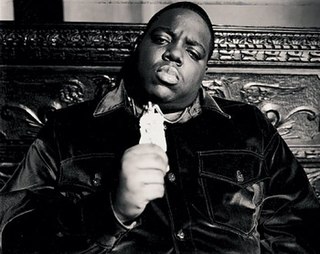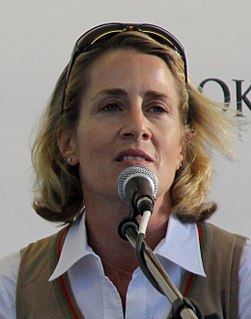A Quote by Barry Lyga
Don't be stupid. You're a child. You don't know what it means to be in love." And she flung open the car door as if she wished she had the strength to rip it from the hinges, and stalked off to the house through the rain. That night, I lay in bed, troubled by what she'd said, blocking out the sounds of argument from my parents' room. Was love what my parents had? Yelling at eachother, worrying about money? Never smiling? Never happy? If that was love, then I didn't want it.
Related Quotes
As a child, Kate hat once asked her mother how she would know she was in love. Her mother had said she would know she was in love when she would be willing to give up chocolate forever to be with that person for even an hour. Kate, a dedicated and hopeless chocoholic, had decided right then that she would never fall in love. She had been sure that no male was worth such privation.
...she merely wished to find a way out of the maze. She knew that she had become a burden to him: she took things too seriously, turning everything into a tragedy, and failed to grasp the lightness and amusing insignificance of physical love. How she wished she could learn lightness! She yearned for someone to help her out of her anachronistic shell.
She'd always had such contempt for mundanes, the way all Shadowhunters did--she'd believed that they were soft, stupid, sheeplike in their complacency. Now she wondered if all that hatred didn't just stem from the fact that she was jealous. It must be nice not worrying that every time one of your family members walked out the door, they'd never come back.
All she saw, down in the cellar well beneath the stoop, was a light yellow feather with a tip of green. And she had never named him. Had called him "my parrot" all these years. "My parrot." "Love you. "Love you." Did the dogs get him? Or did he get the message - that she said, "My parrot" and he said, "Love you," and she had never said it back or even taken the trouble to name him - and manage somehow to fly away on wings that had not soared for six years.
She looked at him then, but his image blurred behind tears that swelled into her eyes. She must leave. She must leave this room, because she wanted to hit him, as she had sworn she never would do. She wanted to cause him pain for taking a place in her heart that she wouldn't have given him if she'd known the truth. "You lied to me," she said. She turned and ran from the room.
She'd always known he loved her, it had been the one certainty above all others that had never changed, but she had never said the words aloud and she had never meant them quite this way before. She had said it to him, and she hardly knew what she had meant. They were terrifying words, words to encompass a world.
My mother was very passionate about life and she would do anything for us. And she had to fight alone to raise us. We never had a lot of money for extras or anything. She had to work six days a week, and then she would do breakfast, lunch and dinner. She was a super-woman! For me, I don't know how she did it with three kids.
Daisy was a consciously happy young woman without any of the usual endowments that make for conscious happiness, money apart. She was not pretty, she was not clever, she had no friends, no talents, nor even an imagination to make her think she was happy when she was really miserable. As she was never miserable, she had no need of an imagination.
My mom is from Jamaica and she was going to school in the morning, and in the evening she was working, and at night she would go to night school and then come in and go to sleep. So she would never watch the news and stuff like that and she didn't know what crack was. She didn't know nothing about it, but when I told her I was selling crack, she threatened to kick me out of the house. And then I just started paying for stuff - paying her bills and giving her money, so she'd just tell me to be careful because there was nothing she could do to stop it.
She came into a room; she stood, as he had often seen her, in a doorway with lots of people round her. But it was Clarissa one remembered. Not that she was striking; not beautiful at all; there was nothing picturesque about her; she never said anything specially clever; there she was however; there she was.
I asked a girl who came from America to England, when I was only English, and she admitted she had been to a drama school. And I said, "What did they teach you?" And she said, "They taught me to be a candle burning in an empty room." I'm happy to say she was laughing while she said it, but she meant it. I've never learned to be a candle burning in an empty room. So I go on the screen, and I say whatever I'm told to say.
Her life was a slow realization that the world was not for her and that for whatever reason she would never be happy and honest at the same time. She felt as if she were brimming always producing and hoarding more love inside her. But there was no release. table ivory elephant charm rainbow onion hairdo violence melodrama honey...None of it moved her. She addressed the world honestly searching for something deserving of the volumes of love she knew she had within her but to each she would have to say I don't love you.
In the classics section, she had picked up a copy of The Magic Mountain and recalled the summer between her junior and senior years of high school, when she read it, how she lay in bed hours after she should have gotten up, the sheet growing warmer against her skin as the sun rose higher in the sky, her mother poking her head in now and then to see if she'd gotten up yet, but never suggesting that she should: Eleanor didn't have many rules about child rearing, but one of them was this: Never interrupt reading.
Her first reaction was one of hope, because his eyes were open and shining with a radiant light she had never seen there before. She prayed to God to give him at least a moment so that he would not go without knowing how much she had love him despite all their doubts, and she felt an irresistible longing to begin life with him over again so that they could say what they had left unsaid and do everything right that they had done badly in the past. But she had to give in to the intransigence of death. (Love in the Time of Cholera)
Not that she didn't love almost every boy she'd ever met, and not that every boy in the world didn't totally love her. It was impossible not to. But she wanted someone to love her and shower her with attention the way only a boy who was completely in love with her could. The rare sort of love. True love. The kind of love she'd never had.







































